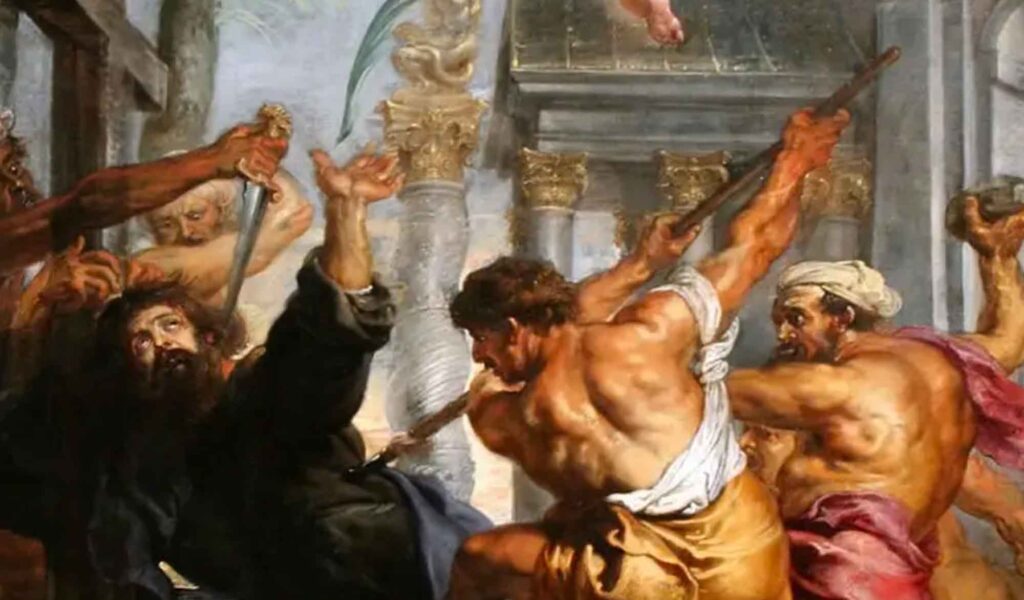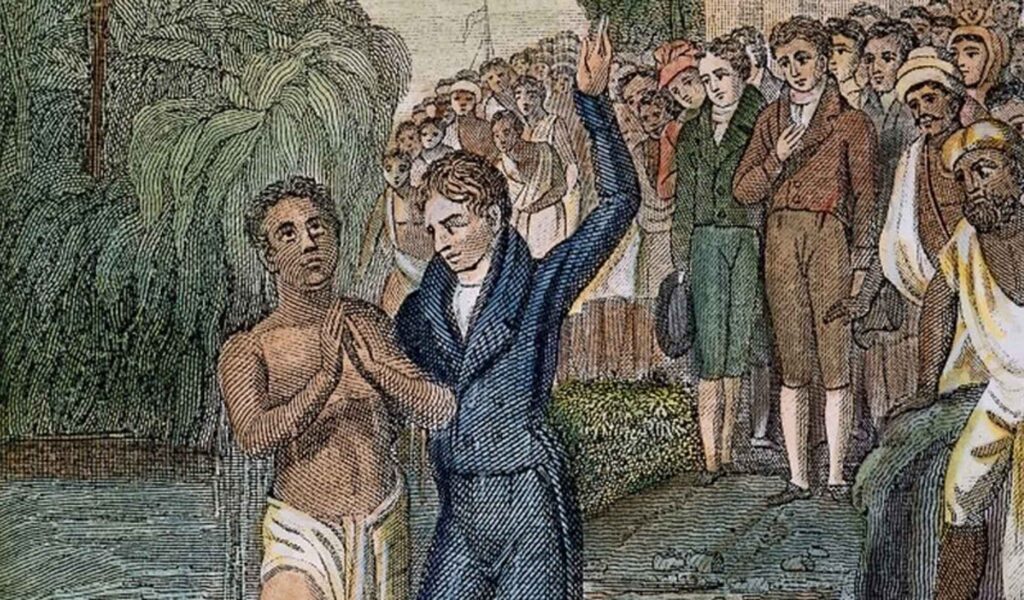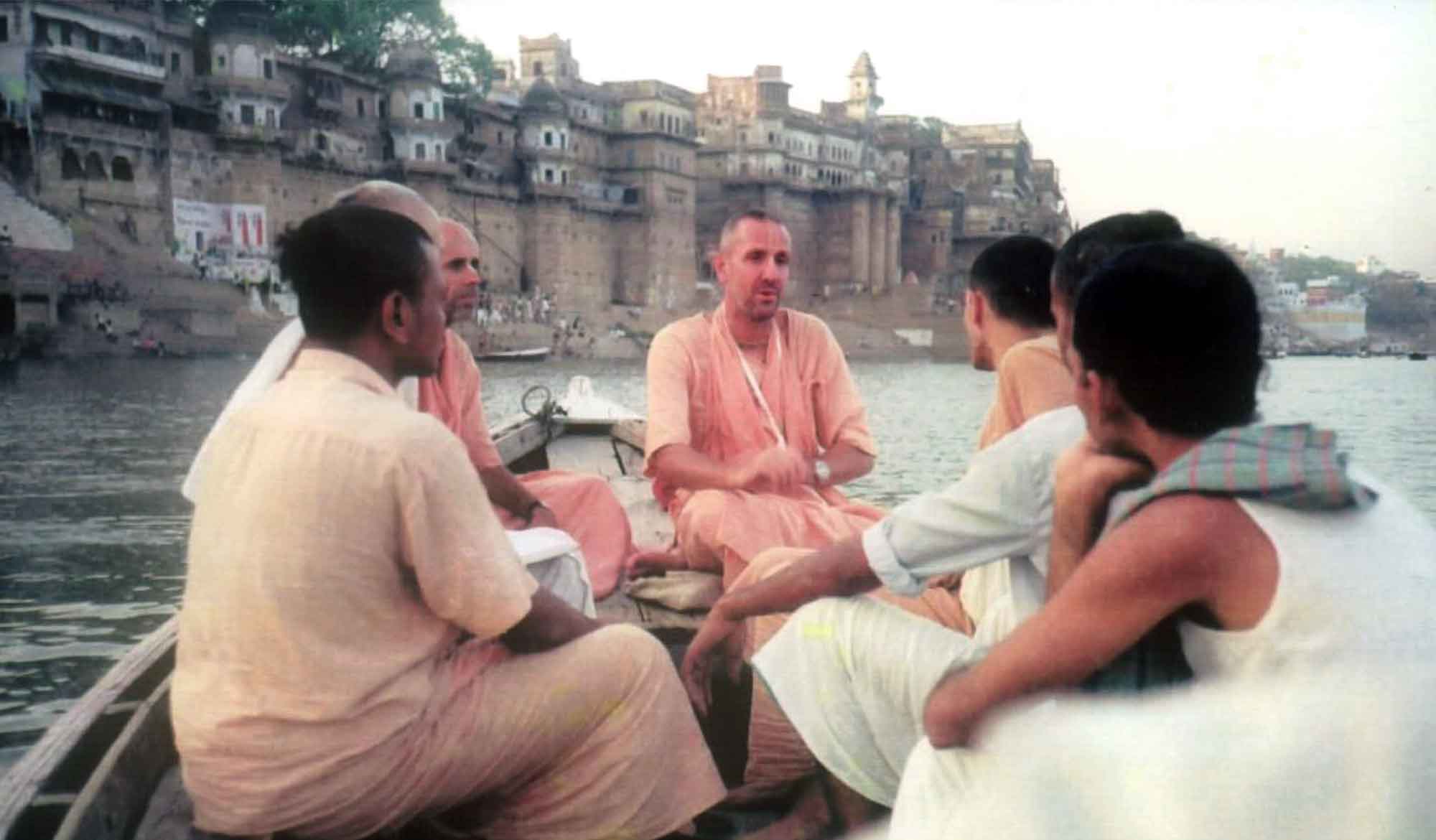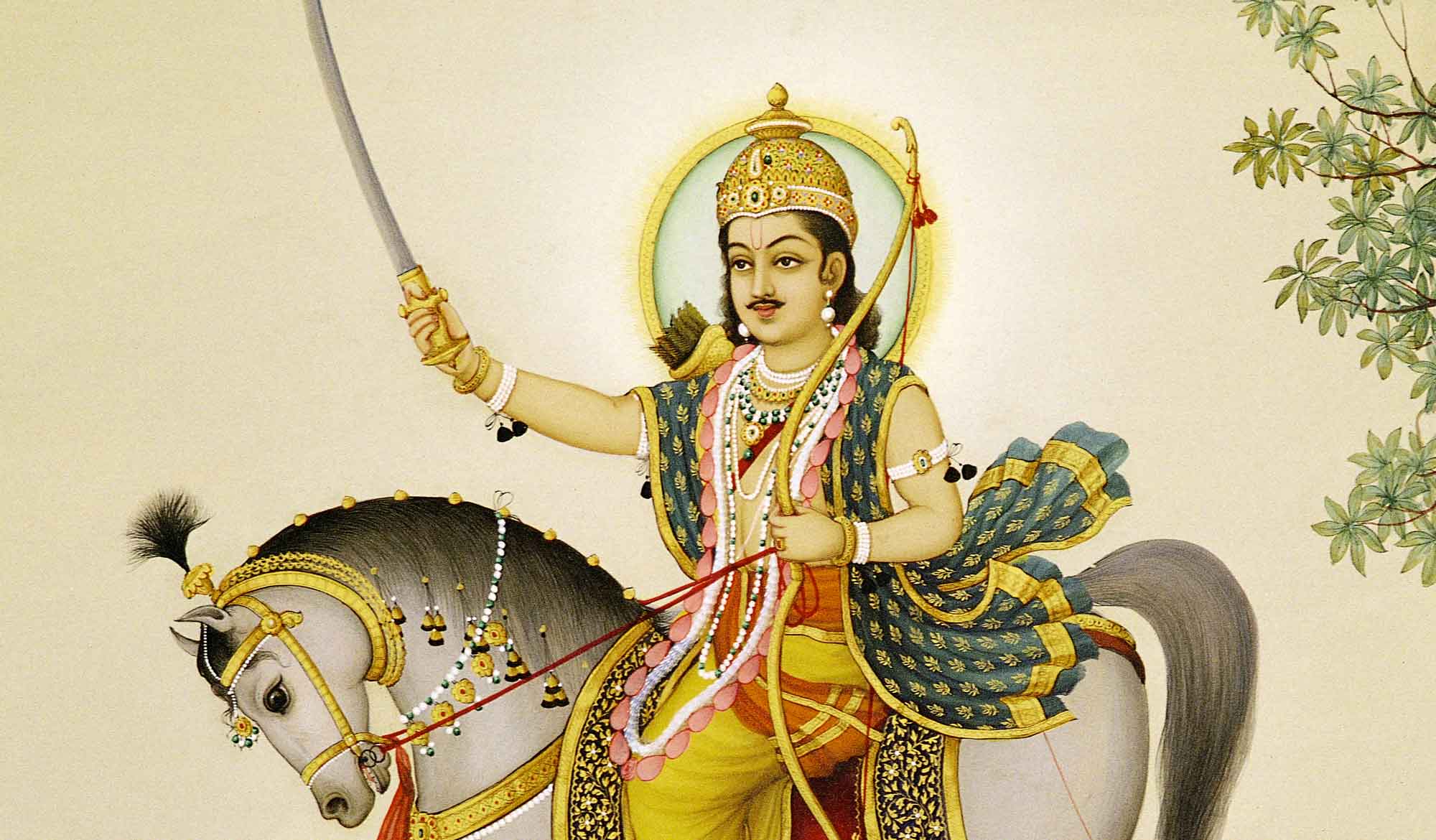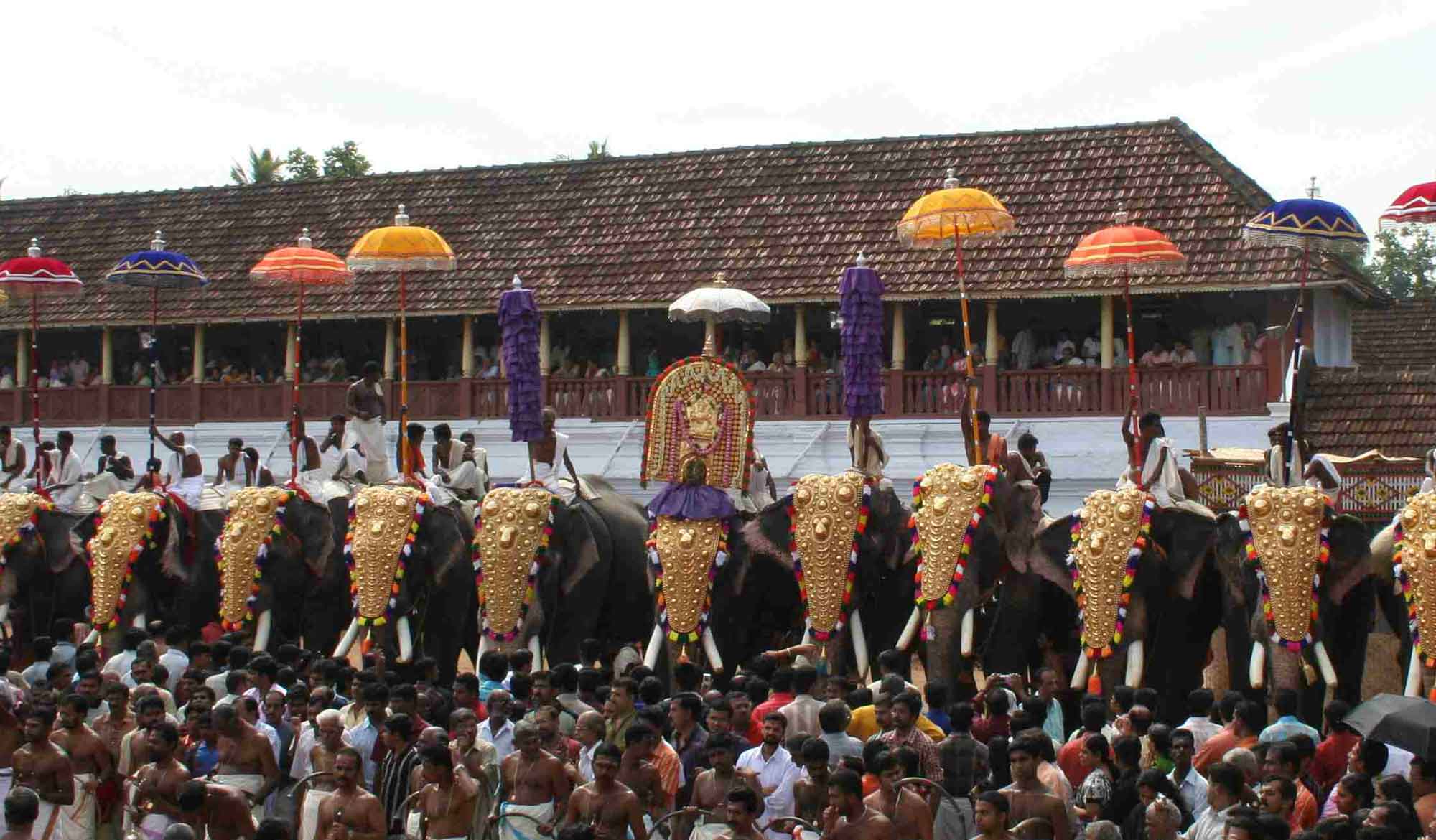by Swami B.G. Narasingha
In ‘The Burning Cross - Part 2’, Śrīla Narasiṅgha Mahārāja, under the pen name of Pradeep Sharma, discusses the Goan Inquisition, how the Christians viewed Lord Jagannātha in Purī, and the thoughts of the Founding Fathers of the Unites States about Christianity.
Since my last article “The Burning Cross” (part-1) appeared on VNN some readers have requested me to write more on the history of Christianity in the crusade against Vaishnavism in India and elsewhere.
The systematic slander and crusade against Vaishnavism seems to have begun immediately after the arrival of the Portuguese and Christian (Catholic) missionaries in India (Goa/Kerala) almost five centuries ago and has to one degree or another persisted up to the present day.
The fall of the Viyajnagar Empire to the Muslim invaders shortly after the arrival of the Portuguese in Goa left much of the coastal regions in the south without a strong Hindu Protector. Thus the Portuguese/Christian conquest in Goa went largely unopposed until the British Raja came to power in India and the Portuguese military eventually withdrew leaving only the Church behind.
The Goan Inquisition was the bloody inauguration of what has been a 500 year slander and crusade against Vaisnavism and now reaches many distant corners of the world. It is recorded and admitted by ‘Saint’ Xavier (a Jesuit Priest) in his letters that he personally insisted that his monarch Dom Joao of Portugal dispatch the Inquisition to India. During this time the figure of a Vaiṣṇava and their shrines were not so distinguishable to the uneducated eye of the Portuguese and so the Inquisition focused on Brahmanism in general and not particularly on Vaisnavism. After starting the Inquisition, Xavier departed for Japan and did not stay in Goa to see the bloodshed and suffering that he caused.
Not able to withstand the horrors of the Portuguese/Christian conquest in Goa thousands of Gauda Saraswat Vaishava brahmanas made a mass exodus at that time and resettled in Dakshin Kannada (Karnataka) to the south. These Gauda Saraswata brahmanas from Goa who settled in Karnataka were the forefathers of Rupa and Sanatana Goswamis.
After sometime the Protestant Churches also joined the crusade against everything Indian or Vedic with a particular scorn for Lord Jagannath at Puri. The Protestant Reverends of the times such as Rev. Claudius Buchanan (1813) considered Jagannath as a morbid God of death with a bloodthirsty smile. These missionaries and Christian travellers in India created a gross misrepresentation of the sect of Jagannath and spread their maliciousness throughout the Christian world in their writings. Rev. Claudius Buchanan wrote:
“From Surat to this place (Jagannatha Puri, a distance of not less than 3000 kilometers), all the highway was stowed with dead people, our noses never free from the stink of them. Women were seen to roast their children. A man or woman no sooner dead but they were cut in pieces to be eaten.
“I have seen Juggernaut. The scene at Bhadrak is but the vestibule of Juggernaut. No record of ancient or modern history can give, I think, an adequate idea of this Valley of Death; it may be truly compared with the Valley of Hinnom (a place in Israel where human child sacrifices were performed before the god Moloch). The idol called Juggernaut has been considered as the Moloch of the present age; and he is justly so named, for the sacrifices offered up to him by self-devotement are not less criminal, perhaps not less numerous, than those recorded of the Moloch of Canaan (Canaan was the state and Hinnom the city for human child sacrifices).
“The senses are assailed by the squalid and ghastly appearance of the famished pilgrims; many of whom die in the streets of want or disease; while the devotees, with clotted hair and painted flesh, are seen practicing their various austerities, and modes of self-torture. Persons of both sexes, with little regard to concealment, sit down on the sands, close to the town in public view; and the sacred bulls walk about among them and eat the ordure (stool).
“The idol is a block of wood, having a frightful visage painted black, with a distended mouth of a bloody colour. The characteristics of Moloch’s worship are obscenity and blood.” (From the diary of Rev. Claudius Buchanan)
Robert Southey (1809) wrote in “Curse of Kehama” (XIV 5) a scornful poem about Lord Jagannatha to the delight of his Christian readers.
“The ponderous car rolls on and crushes all,
Through flesh and bones it ploughs its dreadful path.
Groans rise unheard; the dying cry and death and agony.
Are trodden under foot by your mad throng.
Who follow close and thrust the deadly wheels along.”
The Christian crusade against Jagannath was summed up by J. Peggs in his book “A History of the General Baptist Mission”, London, 1846 as follows:
“Juggernaut, the great, the obscene, the bloody Juggernaut, must fall; Long perhaps will be the struggle and fierce the conflict but he must fall; and the place which knows him now will know him no more for ever.”
These exaggerated and scornful criticisms of Jagannath were intended to stir the emotions of a Christian population in Europe grown complacent to missionary activities of the Church. The Church was in need of fresh recruits (missionaries) and the obvious financial support needed to carry out missionary activities. These scornful criticisms were also intended to shame the Hindu population.
Still to this day missionary activities of the Church are still going on in Orissa aimed at undoing the worship of Jagannath and decrying the Vaishavas and their creed.
No more clear and unbiased evidence of the Christian (Catholic) lack of tolerance and utter hatred for any form of religion other than their own is shown in the Jesuit Oath. This oath, from 16th century circa, is still uttered in Latin by those men who take to the robes of the Jesuit order in modern times. The oath clearly reveals the evil commitment of their creed and curiously enough even mentions India. An excerpt from that oath follows.
“I do further promise and declare, that I will have no opinion or will of my own, or any mental reservation whatever, even as a corpse or cadaver, but will unhesitatingly obey each and every command that I may receive from my superiors in the Militia of the Pope and of Jesus Christ.
“That I may go to any part of the world withersoever I may be sent, to the frozen regions of the North, the burning sands of the desert of Africa, or the jungles of India, to the centers of civilization of Europe, or to the wild haunts of the barbarous savages of America, without murmuring or repining, and will be submissive in all things whatsoever communicated to me.
“I furthermore promise and declare that I will, when opportunity presents, make and wage relentless war, secretly or openly, against all heretics, Protestants and Liberals, as I am directed to do, to extirpate and exterminate them from the face of the whole earth; and that I will spare neither age, sex or condition; and that I will hang, waste, boil, flay, strangle and bury alive these infamous heretics, rip up the stomachs and wombs of their women and crush their infants’ heads against the walls, in order to annihilate forever their execrable race. That when the same cannot be done openly, I will secretly use the poisoned cup, the strangulating cord, the steel of the poniard (dagger) or the leaden bullet, regardless of the honor, rank, dignity, or authority of the person or persons, whatever may be their condition in life, either public or private, as I at any time may be directed so to do by any agent of the Pope or Superior of the Brotherhood of the Holy Faith, of the Society of Jesus.”
The Catholic Church and the Protestant Church are indeed deeply divided as the above oath clearly suggests. Both parties are quick to persecute (kill, murder and torture) each other and even members of their own faith, what to speak of a person (man, woman, or child) of a foreign faith.
We have God to thank for secular governments who guarantee freedom of faith; otherwise anyone non-Christian in this world would soon be hung, boiled, flayed, strangled, buried alive, stomachs and wombs ripped up, or have their infants’ heads crushed against the walls.
This raises a very interesting point. The United States of America (a secular government) is perhaps the single greatest refuge or sanctuary for religious freedom in the world. This is because the constitution of that country guarantees freedom of religion to people of all faiths. Ironically America is seen to be a Christian country and most people believe it always has been. This however is not a fact.
The United States of America only gradually became a dominantly Christian country, after its inception. The founding fathers of that great country were in fact trying to escape Christian oppression (both Catholic and Protestant) in Europe and even though many were Christians themselves they wanted above all to guarantee religious freedom to others. They felt that without freedom of choice a person could not have real faith or religion — a point that all deep thinkers of our day will surely concur.
Many of those founding forefathers of America were Deists (a belief in God based on reason rather than revelation, and involving the view that God has set the universe in motion but does not interfere with how it runs) and not Christians. These Deists had a great influence over the making of the United States Constitution and that document is considered to be one of the most enlightened political statements ever written.
The founders of the United States rarely practiced what today we might call Christianity. Although they supported the free exercise of any religion, they understood the dangers of religion. Most of them believed in Deism, and many attended Freemasonry lodges. Masonry welcomed anyone from any religion or non-religion, as long as they believed in a Supreme Being. Washington, Franklin, Hancock, Hamilton, and even Lafayette, and many others accepted the order Freemasonry.
The American forefathers’ distain for Christianity, in no uncompromising words, is quite clear from their many statements and letters.
Thomas Paine (Statesman/Author) states:
“Whenever we read the obscene stories, the voluptuous debaucheries, the cruel and torturous executions, the unrelenting vindictiveness, with which more than half of the Bible is filled, it would be more consistent that we call it the word of a demon than the word of God. It is a history of wickedness that has served to corrupt and brutalize mankind.
“Take away from Genesis the belief that Moses was the author, on which only the strange belief that it is the word of God has stood, and there remains nothing of Genesis but an anonymous book of stories, fables, and contradictory or invented absurdities, or of downright lies.”
Benjamin Franklin states:
“I wish it (Christianity) were more productive of good works…I mean real good works… not holy-day keeping, sermon-hearing…or making long prayers, filled with flatteries and compliments despised by wise men, and much less capable of pleasing the Deity.”
“If we look back into history for the character of the present sects in Christianity, we shall find few that have not in their turns been persecutors, and complainers of persecution. The primitive Christians thought persecution extremely wrong in the Pagans, but practiced it on one another. The first Protestants of the Church of England blamed persecution in the Romish Church, but practiced it upon the Puritans. They found it wrong in Bishops, but fell into the practice themselves both here (England) and in New England (USA).”
“Some books against Deism fell into my hands. It happened that they wrought an effect on me quite contrary to what was intended by them; for the arguments of the Deists, which were quoted to be refuted, appeared to me much stronger than the refutations; in short, I soon became a thorough Deist.”
Thomas Jefferson (Author of the Declaration of Independence and the Virginia Statute for Religious Freedom) states:
“Millions of innocent men, women and children, since the introduction of Christianity, have been burnt, tortured, fined, imprisoned; yet we have not advanced an inch towards uniformity. What has been the effect of coercion? To make one half the world fools, and the other half hypocrites — to support roguery and error all over the earth. I do not find in orthodox Christianity one redeeming feature.”
“It has been fifty and sixty years since I read the Apocalypse (Revelations), and then I considered it merely the ravings of a maniac.”
“I have recently been examining all the known superstitions of the world, and do not find in our particular superstition (Christianity) one redeeming feature. They are all alike founded on fables and mythology.”
“We discover in the Gospels a groundwork of vulgar ignorance, of things impossible, of superstition, fanaticism and fabrication.”
“The legitimate powers of government extend to such acts only as are injurious to others. But it does me no injury for my neighbor to say there are twenty gods, or no God. It neither picks my pocket nor breaks my leg.”
“Believing with you that religion is a matter which lies solely between man and his God, that he owes account to none other for his faith or his worship, that the legislative powers of government reach actions only, and not opinions, I contemplate with sovereign reverence that act of the whole American people which declared that their legislature should ‘make no law respecting an establishment of religion, or prohibiting the free exercise thereof,’ thus building a wall of separation between church and State.”
It is interesting to note that in his autobiography Thomas Jefferson also made a specific mention of the “Hindoo” (as well as others) assuring them their religious freedom in the United States. Jefferson wrote in reference to the “Virginia Act for Religious Freedom” as follows:
“Where the preamble declares, that coercion is a departure from the plan of the holy author of our religion, an amendment was proposed by inserting ‘Jesus Christ,’ so that it would read ‘A departure from the plan of Jesus Christ, the holy author of our religion;’ the insertion was rejected by the great majority, in proof that they meant to comprehend, within the mantle of its protection, the Jew and the Gentile, the Christian and Mohammedan, the Hindoo and infidel of every denomination.” (Merrill D. Peterson, “Thomas Jefferson Writings”, Library of America, 1984)
James Madison (Considered the father of the American Constitution) states:
“Ecclesiastical establishments tend to great ignorance and corruption, all of which facilitate the execution of mischievous projects.”
“The purpose of separation of church and state is to keep forever from these shores the ceaseless strife that has soaked the soil of Europe in blood for centuries.” (1803 letter objecting use of gov. land for churches)
John Adams states;
“As I understand the Christian religion, it was, and is, a revelation. But how has it happened that millions of fables, tales, legends, have been blended with both Jewish and Christian revelation that have made them the most bloody religion that ever existed?” (letter to F.A. Van der Kamp, Dec. 27, 1816)
“I almost shudder at the thought of alluding to the most fatal example of the abuses of grief which the history of mankind has preserved– the Cross. Consider what calamities that engine of grief has produced!” (letter to Thomas Jefferson)
“The divinity of Jesus is made a convenient cover for absurdity. Nowhere in the Gospels do we find a precept for Creeds, Confessions, Oaths, Doctrines, and whole cartloads of other foolish trumpery that we find in Christianity.”
“The question before the human race is, whether the God of Nature shall govern the world by his own laws, or whether priests and kings shall rule it by fictitious miracles?”
“Have you considered that system of holy lies and pious frauds (Christianity) that has raged and triumphed for 1,500 years? (Now for 2000 years)”
George Washington the father of the United States was very private about his beliefs, but it is widely considered that he was a Deist like his colleagues. He was a Freemason. Historian Barry Schwartz writes:
“George Washington’s practice of Christianity was limited and superficial because he was not himself a Christian… He repeatedly declined the church’s sacraments. Never did he take communion, and when his wife, Martha, did, he waited for her outside the sanctuary… Even on his deathbed, Washington asked for no ritual, uttered no prayer to Christ, and expressed no wish to be attended by His representative.” (New York Press, 1987, pp. 174-175)
Paul F. Boller states in is anthology on George Washington:
“There is no mention of Jesus Christ anywhere in his extensive correspondence.” (Dallas: Southern Methodist University Press, 1963, pp. 14-15)
After George Washington’s death, Dr. Abercrombie, a friend of his, replied to a Dr. Wilson, who had interrogated him about Washington’s religion, “Sir, Washington was a Deist.” (John E. Remsburg, Six Historic Americans (New York: Truth Seeker Co.).
The fact that the United States was never really intended to be a “Christian” country is further demonstrated in a little-known legal document written in the late 1700s circa that explicitly reveals the secular nature of the United States. Officially called the “Treaty of Peace and Friendship Between the United States of America and the Bey and Subjects of Tripoli, of Barbary” commonly referred to as the “Treaty of Tripoli.” In Article eleven it states:
“As the government of the United States of America is not in any sense founded on the Christian religion; as it has in itself no character of enmity against the laws, religion or tranquility of Mussel men; and as the said States never have entered in any war or act of hostility against any Mohammedan nation, it is declared by the parties that no pretext arising from religious opinions shall ever produce an interruption of the harmony existing between the two countries.” (Hunter Miller, Treaties and Other International Acts of the United States of America, vol. 2, docs. 1-40: 1776-1818. D.C.: U.S. Government Printing Office, 1931).
Again, I say thank God for secular government and men and women who can tolerate the faith of another human being. This is a luxury available in few countries of the world. India, the United States and the United Kingdom are on that list but not all of Europe or Russia, what to speak of Islamic countries, none of which have such freedoms. There the crusade against Vaishnavism raises its head again and again.
Recent reports from Russia and Poland concur that the Orthodox Church and the Catholic Church are attempting to minimize the activities of devotees (Hare Krishna) in every way. And in Uzbekistan the Islamic government has recently closed down the Hare Krishna temple.
In the United States the Baptist Church recently distributed pamphlets in America making outrageous and offensive statements about Hinduism (of which they consider the Hare Krishna’s a part). When asked to make an apology to the Hindu community the Church showed no signs of genuine remorse. Similar activities of the Church are also going on at this very moment in India. Therefore, all that is require for the crusade against Vaishnavism to be successful is for devotees to stand by and say nothing.
In the third and final part of “The Burning Cross” I will answer a variety of questions on these topics that I have received from devotees around the world.
More Articles by Swami B.G. Narasingha
Banaras – The City of Light
“Banaras - The City of Light” was originally written by Śrīla Narasiṅgha Mahārāja for Clarion Call magazine in 1990. This article explains something of the history of Banaras and its significance to Hindus.
The Dawn of the Age of Love?
“Dawn of the Age of Love” was written in 2009 by Śrīla Narasiṅgha Mahārāja in response to the erroneous idea that Kalki-avatāra does not appear at the end of this Kali-yuga. Quoting previous ācāryas, he shows that this is not the case.
Guruvayur
“Guruvayur” was an article written by Śrīla B.G. Narasiṅgha Mahārāja in 1989 for ‘Clarion Call’ magazine, Vol.2, issue 3. Narasiṅgha Mahārāja explains the history of the famous temple in Kerala as well as some of its peculiarities.

